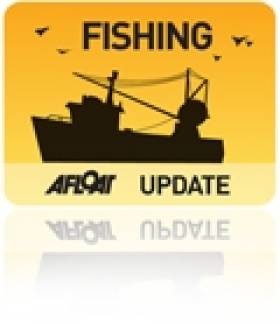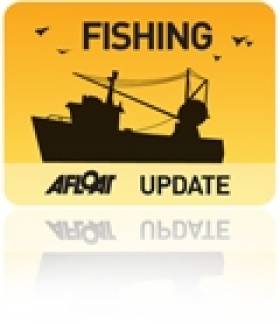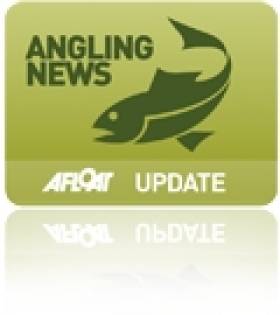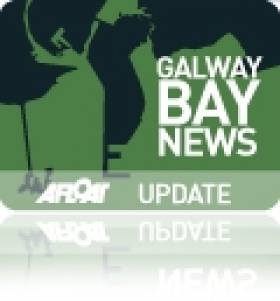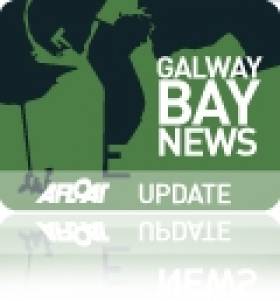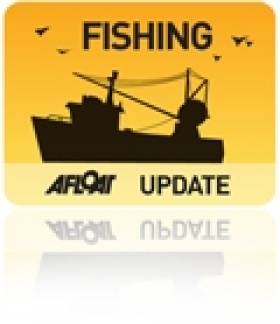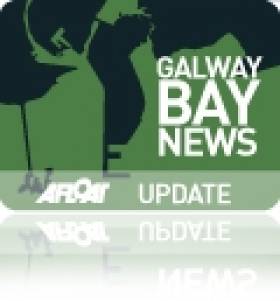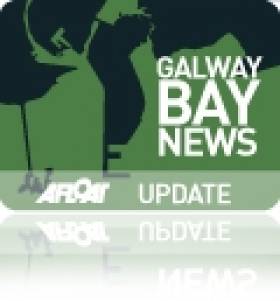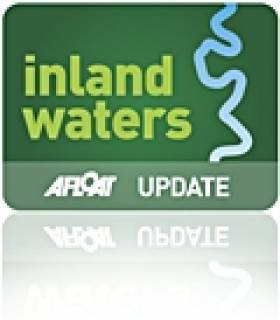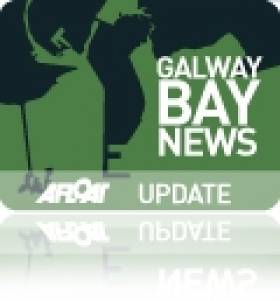Displaying items by tag: aquaculture
Morning Ireland Reports On Galway Bay Fish Farm Debate
#FishFarm - RTÉ Radio 1's Morning Ireland reports on last night's public meeting in Galway on the proposed deep sea fish farm in Galway Bay.
As previously reported on Afloat.ie, the 500-hectare organic salmon farm proposed by Bord Iascaigh Mhara (BIM) would be located off Inis Oírr in the Aran Islands, and would be the largest of its kind in Europe, set to double the State's production rate of organic salmon.
BIM's aquaculture development manager Donal McGuire moved to reassure concerned locals that the agency was "not about to damage [its] reputation" by "doing something foolish or doing something that will cause serious environmental damage".
McGuire added that organic salmon is Ireland's leading organic food export but is in "very very short supply", and that business would be lost to producers in Scotland and Norway.
However, the scheme has faced strong opposition from fisheries groups and local anglers citing the potential environmental impact on wild salmon numbers and the threat to tourism in the area.
At last night's meeting, RTE's western correspondent Pat McGrath says just two of the more than 100 in attendance spoke in support of the fish farm plans.
Another public meeting on the proposals is scheduled for tonight in Rossaveal.
BIM is expected to hold a public tender process for the proposed salmon farm project pending approval by Marine Minister Simon Coveney.
High Levels of Sea Lice Detected at Irish Salmon Farms
#FishFarm - Two Irish fish farms were found to have consistently high levels of sea lice over the past six months, according to new figures.
Undercurrent News reports on findings by the Marine Institute which show that a farm owned by Marine Harvest Ireland at Lough Swilly and one operated by the Mannin Bay Salmon Company in Corhounagh were "found to have levels of sea lice which exceed the Marine Institute's protocol level of two pregnant female lice per fish."
Sea lice levels at the Lough Swilly site in particular climbed from an average of 4.35 per fish to a high of 71.72 in September before dropping to a still-high 44.88 last month.
A statement issued by Marine Harvest played down concerns over the new figures, noting that "treatment trigger levels are set a low level" in Ireland compared to other countries, and that it uses "tried and tested procedures" to deal with such infestations.
It added that lice numbers can rise and fall in tandem with changes in climate, as experienced in the latter months of 2012.
As reported on Afloat.ie last month, a new international study says some 39% of salmon mortalities can be attributed to the impact of sea lice - predominantly from fish farms - on wild salmon fisheries.
In a press release, Don Staniford of lobby group the Global Alliance Against Industrial Aquaculture (GAAIA) said: “The Irish Government should be controlling sea lice infestation on salmon farms not promoting even bigger feedlots such as the proposed 15,000-metric-ton farm in Galway Bay.”
Undercurrent News has more on the story HERE.
IFI Repeats Concerns Over Aran Islands Fish Farm
#Angling - Anglers on the River Feale in Kerry and Limerick have been assured by Inland Fisheries Ireland (IFI) that it supports their concerns over the proposed deep-sea fish farm in Galway Bay, as the Limerick Leader reports.
Local anglers are among those throughout the region who have rallied in opposition to plans for the Aran Islands fish farm project, over fears that it would lead to “an explosion” in parasitic sea lice which would prey on wild inland salmon from Irish rivers feeding in the North Atlantic.
IFI reiterated its statement issued last month in which its board said it does not believe "that the corpus of peer reviewed international scientific literature which recognises the negative impacts of sea lice on salmonids have been adequately dealt with" in the Environmental Impact Statement prepared by Bord Iascaigh Mhara (BIM) as part of the public consultation process.
A spokesperson for IFI told the Limerick Leader that the authority has "major concerns about the location and scale [of the farm], as well as its potential impact on sea life. [IFI] is not supporting it in its current form.”
Earlier this month the National Inland Fisheries Forum also criticised as "flawed" the consent process regarding the 15,000-tonne organic salmon farm planned off Inis Oirr, which would be the largest of its kind in Europe.
If approved, the operation could more than double Ireland's current production rate of farmed salmon.
The Limerick Leader has much more on the story HERE.
Fisheries Forum Lambasts Minister Over Galway Bay Fish Farm Decision Process
#FishFarm - The National Inland Fisheries Forum (NIFF) has criticised as "flawed" the consent process regarding the proposed deep-sea fish farm in Galway Bay which has stirred much controversy in recent weeks.
In a letter to the Department of Agriculture, Food and the Marine as part of the public consultation process, NIFF chair Derek Davis writes that the forum "considers the consent process to be flawed" as a result of "the decision making function being exercised by the Minister for Agriculture, Fisheries and Food" in a number of circumstances, including where:
- the applicant - Bord Iascaigh Mhara (BIM) - "has several appointees of the said minister at board level";
- the State fisheries board "receives funding and policy directions from the minister's department";
- public announcements made on the proposals and related concerns "indicate pre-judging of the issues";
- any appeal following the minister's decision "would be dealt with by appointees of the minister"; and where
- the "specific statutory basis" on which BIM authorises aquaculture operations "has not been adequately set out".
The letter reiterates Inland Fisheries Ireland's (IFI) criticisms of the Environmental Impact Statement (EIS) carried out on the proposed location of the 15,000-tonne organic salmon farm off the Aran Islands, stating the NIFF's believe that the document "is deficient in a number of areas" such as not adequately addressing wild salmon migration routes, and making presumptions on the potential impact of sea lice and escaped farmed salmon on adjacent fisheries.
The forum also has concerns regarding the public consultation itself, noting that requests for "specific scientific information used to underpin statements in the EIS" have not been followed through.
"The forum believes that on the basis of the information supplied, the minister is not in a position to make a positive decision on this application," writes Davis. "To do so would represent a failure to adhere to the precautionary principle" which applies "where there is uncertainty as to the existence or extent of risks".
The letter in full is available as a PDF to download HERE.
Groups To Protest Marine Minister's Office Over Galway Bay Salmon Farm
#FishFarm - A group opposed to the Galway Bay deep-sea salmon farm proposals has announced it will protest the constituency office of Marine Minister Simon Coveney this Saturday 15 December.
In a statement to the media, No Salmon Farms At Sea (NSFAS) said that it will join likeminded groups Save Bantry Bay, Save Galway Bay, FISSTA and Friends of the Irish Environment, along with other local and national organisations, in a protest march through Carrigaline, Co Cork to Minister Coveney's office in the town, where invited speakers will address the crowd to express their opposition to the fish farm.
As previously reported on Afloat.ie, the 15,000-tonne deep-sea organic salmon farm would be located on a 500-hectare site in Galway Bay off Inis Oirr in the Aran Islands, and would be one of the largest projects of its kind in Europe, projected to be worth more than €100 million annually for the economy, according to Bord Iascaigh Mhara (BIM).
But the proposals have raised the ire of local anglers and conservationists who fear the development could have a negative impact on wild salmon numbers in the area.
"Minister Coveney has been a strong supporter of the aquaculture industry and we intend to let him know that his support is misguided and will result in catastrophe not only for our stocks of wild atlantic salmon and sea trout, but also for the communities and local businesses that depend on their very existence," said NSFAS.
The statement also cited the recent international study involving experts from Inland Fisheries Ireland which concluded that 39% of all young salmon mortalities are directly attributable to sea lice in areas where salmon farming takes place.
It added: "The highly inflated number of jobs, which BIM claim will be created, will be far outweighed by the number of jobs lost in areas where no other industry exists apart from that in tourism...
We have a world class sport fishery here in Ireland and our outwardly projected clean environment is one of our greatest assets. However it is fragile and will be destroyed if the salmon farming industry is developed further.
"Anglers and conservationists will do everything in their power to prevent any further destruction to our environment and already declining wild salmon and sea trout stocks."
Meanwhile, in today's Irish Times, angling correspondent Derek Evans writes that "anglers, stakeholders, hoteliers, restaurateurs, islanders and west coast citizens are 'up in arms' and rallying in large numbers in opposition" to what he describes as "this outrageous proposal".
He also backtracked on his previous claim about the location of the deep-sea farm as "a step in the right direction", explaining that he was contacted by a man living on Inis Oirr who said the location for the new fish farm is just "one land mile" opposite the beach, posing a threat to its tourism assets.
The Irish Times has much more on the story HERE.
BIM to Hold Public Tender for Galway Bay Fish Farm
#FISHFARM - Bord Iascaigh Mhara (BIM) is set to hold a public tender process for the development of the proposed deep sea fish farm in Galway Bay, according to The Irish Times.
Financiers around the world have expressed interest in the 500-hectare organic salmon farm to be located off Inis Oirr in the Aran Islands, though BIM said it was not at liberty to disclose who they are.
As previously reported on Afloat.ie, the proposed fish farm would be the largest of its kind in Europe, set to double the State's production of organic salmon.
BIM says it is already receiving inquiries for jobs from emigrants wishing to return home.
However the scheme has faced opposition from Inland Fisheries Ireland (IFI) and local anglers, who cite the potential threat to wild salmon numbers in the area.
IFI recently issued a statement regarding its submission on the project's Environmental Impact Statement, raising concerns about the scale of the development and the impact of sea lice - infestations of which are often concentrated by aquaculture.
The public consultation that began in mid-October is scheduled to conclude next Wednesday 12 December.
Angling Writer 'Deeply Concerned' Over Aran Islands Fish Farm Plans
#GALWAY FISH FARM - In his latest angling column for The Irish Times, Derek Evans writes of his 'deep concern' over the proposed deep sea salmon farm off the Aran Islands in Galway Bay.
Making reference to new research that shows infestations of sea lice - which often concentrate in fish farms - pose a significant threat to the survival of wild salmon fisheries, as previously reported on Afloat.ie, Evans writes that the "untold damage" from such infestations would be "nothing short of catastrophic".
He adds: "While this latest proposal is a step in the right direction in terms of its 'off-shore' location, nevertheless, it will bring a plethora of problems, beginning with the size of its annual output and the 'baggage' that entails if and when it moves into unchartered waters."
Evans also points to the submission on the Environmental Impact Statement (EIS) made by Inland Fisheries Ireland (IFI), which includes "an additional checklist for consideration including the location and dimension of this proposed farm; site characteristics; production process; potential impacts; monitoring; and organic farming", as well as suggesting an assessment of all wild salmon fisheries in the affected area, plus a full monitoring system and baseline study.
Evan's comments come in the wake of IFI's dispute with Bord Iascaigh Mhara over the exclusion from the statutory consultation of a report critical of the proposed salmon farm off Inis Óirr, which has faced opposition from local salmon anglers.
The Irish Times has much more on the story HERE.
IFI Board Issues Statement on Galway Bay Fish Farm
#GALWAY FISH FARM - The board of Inland Fisheries Ireland (IFI) has issued a statement on the proposed Aran Islands deep sea salmon farm in Galway Bay, which has been the source of some controversy in recent weeks.
The board said it agrees with the recent statement by Minister Fergus O’Dowd on offshore salmon farming, and that it welcomes the development of Ireland’s aquaculture sector "once any development complies with Ireland’s obligations under relevant EU environmental legislation, particularly the Habitats Directive, and does not adversely affect salmon and sea trout stocks."
In addition, the IFI board said it has made a submission on the Environmental Impact Statement (EIS) prepared by Bord Iascaigh Mhara (BIM) for the proposed offshore salmon farm as part of the public consultation process, which is available on the IFI website.
As previously reported on Afloat.ie, the public consultation period began last month for the 500-hectare organic fish farm to be located off Inis Oirr. BIM has applied for a deep sea salmon farming licence at the site, which would be one of the largest of its kind in Europe. If approved, the operation could more than double Ireland's current farmed salmon production rate.
The IFI board's statement notes: "In the submission, concerns were raised in relation to the location and scale of the proposed salmon farm and how its development and operation could impact on wild salmon and sea trout stocks and their habitat.
"These concerns are based on scientific reports by respected authors and knowledge of the impact of existing fish farms on salmon and sea trout populations off the west coast of Ireland."
The submission also highlights "recent peer reviewed international scientific literature on the impacts of sea lice on salmonids" which poses a significant threat to wild salmon in Irish waters, as reported on Afloat.ie.
The board said it does not believe "that the corpus of peer reviewed international scientific literature which recognises the negative impacts of sea lice on salmonids have been adequately dealt with in the EIS".
While welcoming "any sustainable initiative which will provide jobs in rural coastal communities", the IFI board said it questions the figure of 500 jobs it's been reported the 15,000-tonne fish farm project would create, making comparison to a new 2,000-tonne aquaculture scheme in Scotland that's expected to create just four full-time positions.
The board members say they "have serious concerns that whatever the number of jobs created by the current proposal, they will be more than offset by the associated loss of jobs in the recreational angling and tourism sectors" if the scheme results in any negative effects on those areas.
"Ireland's reputation as a pristine wild fishery destination must be safeguarded," they added, noting that proposals for two further offshore salmon farms in Mayo and Donegal "are premature given that significant issues over the current proposal have not yet been resolved.
"No further applications should be progressed until all stakeholders are satisfied that the current proposal is sustainable and has no adverse impact on wild salmon and sea trout stocks."
Inland Fisheries Ireland is the State agency charged with the conservation, protection, development management and promotion of Ireland's inland fisheries and sea angling resource.
Sea Lice Pose Significant Threat to Wild Salmon Says New Research
#ATLANTIC SALMON - About 39% of salmon mortalities were attributable to the impact of sea lice on wild salmon fisheries, according to a new international study.
The research, published in Proceedings of the Royal Society B, involved experts from Inland Fisheries Ireland collaborating with the Scottish Oceans Institute at the University of St Andrews, the Department of Zoology at the University of Otago in New Zealand, the Atlantic Veterinary College at the University of Prince Edward Island in Canada and the Institute of Marine Research in Norway.
In a statement on the report, IFI says: "In previously published studies, groups of salmon smolts were treated to protect them against sea lice infestation and other groups were untreated and both groups released to sea into 10 areas of Ireland and Norway. A proportion of these released fish were recaptured as adult salmon one or more years later.
"Analysis of the results of all previously published studies together provide experimental evidence from a large marine ecosystem that sea lice can have large impacts on salmon recruitment, fisheries, and conservation. The sea lice were likely acquired during early marine migration in areas with salmon farming, which elevate local abundances of sea lice."
IFI says the results "indicate that parasite-associated mortality may cause the closure of some fisheries when conservation targets of return adult abundances are not being met. However, the implications of these results may be most serious for small populations in small river systems."
The inland fisheries body explains that the high natural mortality rate of both treated and untreated salmon groups was accounted for, which revealed "a large effect of parasites".
"Precisely because natural mortality rates are high, even a proportionally small additive mortality from parasites can amount to a large loss in adult salmon recruitment," it adds.
Minister of State for Natural Resources Fergus O'Dowd welcomed the report, stating: “From the results of this detailed study, it is crucial that sea lice levels are maintained below [designated] protocol levels, particularly in spring when wild salmon smolts are migrating to sea to avoid increased marine mortality.
Minister O'Dowd added that the results of this study "augment our knowledge in the context of proposals for aquaculture development".
The news comes in the wake of IFI's dispute with Bord Iascaigh Mhara over the exclusion of a report critical of the proposed new deep sea wild salmon farm in Galway Bay from the statutory consultation.
The scheme has faced opposition from local salmon anglers who fear the new facility would pose a threat to wild salmon stocks in Irish rivers by increasing the risk of sea lice infection.
BIM Brings Fish Farm Consultation to Aran Islands
#GALWAY FISH FARM - Galway Bay FM reports that a series of direct public consultations on the proposed Aran Islands fish farm in Galway Bay will begin this week.
Bord Iascaigh Mhara (BIM) is organising the meetings on the islands and in nearby Galway City to allow the public to view its proposals for what would be one of the largest aquaculture operations in Europe.
As previously reported on Afloat.ie, the public consultation period began last month for the 500-hectare organic fish farm to be located off Inis Oirr. BIM has applied for a deep sea salmon farming licence at the site some 6km off the island.
If approved, the operation could more than double Ireland's current farmed salmon production rate.
The scheme has faced opposition from local anglers and from Inland Fisheries Ireland, who claim it poses a risk to wild salmon stocks.
But BIM has condemned IFI's "stop everything" attitude regarding the fish farm proposals, while accusing environmental campaigners of being "deliberately alarmist", according to the Galway Independent.
Lobby group Friends of the Irish Environment entered a dispute with the sea fisheries board over the exclusion of an IFI report critical of the salmon farm from the statutory consultation.
“In the current climate, with jobs being as scarce as they are and economic development being the way it is, I think really that sort of attitude, that sort of museum curator ‘stop everything’ attitude is not good enough,” said BIM aquaculture development manager Donal Maguire.



























